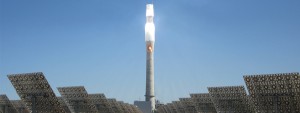
Gemasolar an installation near Seville in southern Spain owned by Torresol Energy, has become the first unit to be able to work through the night thanks to an innovative technique of storing solar energy in molten salt, a cutting-edge thermal-transfer technology developed by SENER.
This system is capable of fifteen hours of electricity production without solar radiation, which overcomes fluctuations in the energy supply. The company said the uniqueness of this technology paves the way for new thermosolar electrical generation technology.
Some of the key features of the farm include:
• Rated electrical power: 19.9 MW
• Net electrical production expected: 110 GWh/year
• Solar field: 2,650 heliostats on 185 hectares
• Heat storage system: the molten salt storage tank permits independent electrical generation for up to 15 hours without any solar feed
Its prolonged capacity to generate power gives Gemasolar an advantage over other similar-sized facilities as its output is much higher. Torresol Energy said the plant’s efficiency guarantees electrical production for 6,500 hours a year, 1.5 to 3 times more than other types of renewable energy. The plant can supply clean, alternative energy to 25,000 homes and reduce atmospheric CO2 emissions by more than 30,000 tons a year.
Gemasolar is the biggest solar power station of its type in Europe. The project is a joint venture between Spain and the United Arab Emirates. Abu Dhabi’s Crown Prince Sheikh Mohammed bin Zayed al Nahyan and King Juan Carlos of Spain were present at the inauguration.
You should follow us here.






The concept of thermosolar electrical generation is extremely promising. And it has the potential of being a viable production source wherever solar feasibility is also high. It would be interesting to know how much more expensive this type of solar installation is compared to the more standard installation.